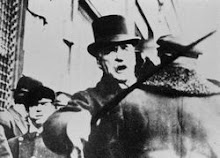In days of yore we had investment banks. These were banks that were not only engaged in bringing new securities to market, the traditional realm of investment banks, but were also buying and selling securities for the banks own account: a practice called proprietary trading.
The trader is allotted a certain percentage of total firm capital to trade. He draws a monthly salary and a bonus as a percentage of any trading profits. If he loses money he is fired.
So for the individual trader the following moral difficulties exist. On the one hand, if he makes a good trade he will pull down a large bonus for the year. This bonus will occur at the end of the year and will be based on any "booked" profit that the trader generated for the firm. But this can be calculated from positions that are still open, and thus still exposed to the risk inherent in any financial decision.
If he doesn't make any profit for the firm he will be paid his monthly salary until he is fired. While a firing has significant opportunity costs associated with it, we're assuming that there is little to no actual monetary loss to the trader associated with his firing (especially in relation to the total amount of proprietary funds the trader is allocated).
So how does the individual trader maximize the expected value of his job? To answer this we will assume that the trader has no actually edge on the financial market he trades: the probability of success (profit) in a year is 50/50.
In this case the trader has the incentive to take as large and as volatile a trade he can. In markets, assuming more risk is usually compensated by having a larger range of upsides and downsides. Normally this increased risk is avoided as the downside outcome is just as scary as the upside is tempting. But we must remember that the worst thing that can happen to a trader at a bank is get fired, which costs him relatively little.
In a financial transaction for an individual investor, he has the chances of both making and losing money. Thus if his chances for success are also 50% and his possible upside profit is A and his downside B, then he has an "expected value" of 0.5*A - 0.5*B. If A = B then the expected value is zero. This is the case usually confronting your average investor, but not so for proprietary traders at an old investment banks. In their case, B = 0 (or close to it), thus making their expected value always positive.
So to maximize their jobs (in terms of expected value) the trader must make A as large as possible, and the only way to do that is to take as large and as risky a bet as the bank will allow him. While this is rational for an individual trader, for the bank this is a recipe for disaster. No trader has any incentive to make sustainable long term bets for the good of the firm. Everyone is making short term decisions that maximize the year end bonus they will receive.
It is important to point out that I am in no way saying that these traders are evil. Any self-interested person would make similar decisions if presented with the same tradeoffs. Why wouldn't you? Nobody is going to get a prize for self-sacrifice at a bank.
I myself am a proprietary trader, although of a much different sort. My contract states that I can be sued by the broker/dealer (my boss) for any losses I may incur while using firm capital, which makes me much more judicious in choosing what strategies I employ! I believe that this model will take hold elsewhere on the street, from prop trading desks to hedge funds. Making managers and traders accountable for the downside of their actions is imperative if we are to fix the current problems we face today. Restoring confidence in the street starts with reforming the internal incentive infrastructures for managers and employees.
Subscribe to:
Post Comments (Atom)
![Reblog this post [with Zemanta]](http://img.zemanta.com/reblog_e.png?x-id=eeed5fa0-c9c3-457e-9edd-affc5e5f7566)





2 comments:
Thanks for the clear and convincing explanation. I suspected that such motivations were at work.
Very similar incentives exist for corporate executives with respect to their stock options and bonuses. We need the same sort of "clawback" restrictions for risky or short-term decisions they are tempted to make.
certainly! those CEO's have just as poor incentives for proper decision making. all of this suggests that time frame (and some kind of long memory for decision outcomes) should finally make its entrance into compensation schemes
Post a Comment